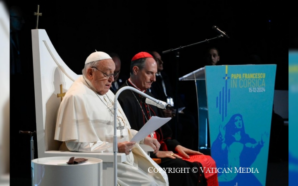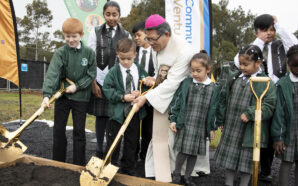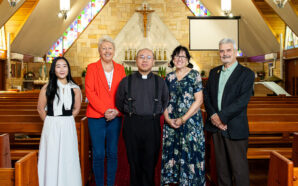The second session of the Synod of Bishops marked an important stage of maturation in the synodal process. How should the church, the family of God in Africa, contribute to discerning new paths together? Five African experts give their opinions to La Croix International throughout the synod.
Pope Francis defined synodality as “the way people in the church learn and listen to one another and take shared responsibility for proclaiming the Gospel.” Thus, synodality is defined as the involvement and participation of the entire people of God in the life and mission of the church. It refers to the very essence of the church, to its constitutive reality, and is, therefore, oriented toward evangelization. It is an ecclesial way of being and a prophetic example for today’s world.
In Africa, the church bears witness to a living faith despite the continent’s many social, economic, and political challenges. Its contribution to the Synod can help renew the universal Church. Africa carries a central spiritual experience in its Christian identity.
Solidarity, mutual aid, and unity are essential pillars within families, basic ecclesial communities, lay groups, and Catholic action associations. This community perspective can inspire a rethinking of the internal dynamics of the universal Church, orienting it more toward an inclusive, synodal church where everyone has a voice and is willing to listen to one another.
These values can be conveyed through the strong messages of synodality, especially the spirit of listening. African voices and values, especially values such as family, solidarity, community life, respectful dialogue, hospitality, and co-responsibility, should be considered when formulating the church’s doctrines and teachings.
In the context of synodality, it would also be interesting to highlight that the church in Africa faces challenges that should be considered in discussions, such as issues related to the climate crisis, migration, and conflicts. This is an opportunity to call for action; in this sense, young people also have a voice.
The church must understand young people’s aspirations, challenges, and realities. First and foremost, young people need to be listened to and invited into decision-making spaces to be involved in the life of the church. At the regional level of the Young Christian Students (YCS), we organize quarterly meetings to listen to all the national movements and discuss the challenges they face. By inviting and involving them in this meeting, it is an opportunity to engage them and then send them on a mission. It is also a moment of communion with our brothers, leaving no one behind.
Increasing youth involvement in church governance
We believe in and advocate for greater inclusion of young people in decision-making and governance within church structures. African youth can and must be the strength of the church. Therefore, it is important and necessary to engage young people in environmental protection and peace promotion. Youth-led initiatives must be supported and accompanied by church leaders.
Within YCS, our spirituality calls us to action and offers us an opportunity to initiate and encourage our members to take action. This year, tree-planting days were organized in the Diocese of Kara in northern Togo to address climate action. This is an example of how we play our role in raising youth awareness.
Another important aspect that the church in Africa could contribute is focusing on education and training for young people. Investing more in education through innovative and inspiring training would benefit the church.
We believe that the church in Africa can leverage technology to reach young people and meet their needs, particularly by increasingly adopting digital platforms for evangelization and spiritual formation. Beyond spiritual formation, the church can raise awareness among young people about the dangers of the digital world (disinformation, addiction, cybercrime) and promote an ethical and responsible use of new technologies.
From a synodal perspective, the church’s contribution in Africa must focus on several points, including unity, inclusion, and respect for all without distinction, to build a stronger and more dynamic church.
Prisca Koffi is Ivorian and is the regional coordinator of the Young Christian Students in Africa (YCS) in Nairobi, Kenya’s capital.
Reproduced with permission from La Croix International.








